This morning I woke to the news via the Canadian Atheist website that only a month after the murder of Avijit Roy, yet another atheist blogger has been hacked to death in the streets of Bangladesh by Islamists. Washiqur Rahman (27), who was working as a trainee at Far East Aviation Services following his graduation from Tejgaon College, wrote on Facebook as Oyasiqur Baba and several atheist blogs under the pseudonym Kucchit Hasher Channa (Ugly Duckling).
Mohammad Jamil Khan of the Dhaka Tribune reports Rahman was set upon in a premeditated attack by three men with machetes only fifteen metres from his home. According to the inquest, most of Rahman’s injuries were to his face and head. Khan states:
While fleeing, two of the killers – Zikrullah, a student of Hefazat-e-Islam’s Hathazari Madrasa in Chittagong, and Ariful, student of Mirpur Darul Uloom Madrasa – were held by two … persons … The other member of the team, Abu Taher, escaped.
The two men were handed over to the police, who also recovered machetes from the scene.
Deputy Commissioner of Tejgaon zone Biplab Kumar Sarker told reporters that in preliminary interrogation the arrestees said they had killed Oyasiqur for writing on religious issues. “We are investigating whether they are involved with any organisation.”
On his Facebook account, Oyasiqur wrote several notes opposing irrational religious beliefs, superstitions and radical Islamists.
He was also an admirer of Avijit Roy. After the attack on Avijit, he changed his profile picture to the hashtag “#iamavijit” on a black background. His Facebook cover photo also displays the hashtag #WordsCannotBeKilled.
Khan spoke to some of Rahman’s family and friends:
He used to write against Jamaat-e-Islami and radical Islamist groups. He was vocal against human rights violations on the religious minorities and indigenous people of the country.
Tamanna Setu, one of Oyasiqur’s friends, said: “I asked him several times not to write about these issues … but he replied: ‘I have no photos on my Facebook account. So they will not recognise me.’”
The International Humanist and Ethical Union (IHEU) has issued a statement about the attack, which includes the following:
Bob Churchill, Director of Communications at the International Humanist and Ethical Union (IHEU) comments: “We are deeply saddened that yet another rationalist voice has been so brutally silenced in this vile backlash against atheist bloggers. Our thoughts are with Washiqur’s family and we stand in solidarity with the many individual thinkers and writers from Bangladesh who exercise their right to discuss religion — Islam in particular — frankly and critically. This is a human right, freedom of expression, and it should be respected and protected in Bangladesh, as it should be respected and protected everywhere.”
As mentioned above, it’s only a month since the murder of atheist blogger Dr Avijit Roy, also in Dhaka. In February 2015, Roy attended the Ekushey Book Fair in Bangladesh with his wife Rafida Ahmed Bonya. The Fair is an annual event dedicated to those who died on 21 February 1952 (Shaheed Day) in a demonstration calling for Bengali to be recognized as an official language of the former East Pakistan. At 8.45pm on the 26th, they were returning home by bicycle rickshaw when they were attacked with machetes by two assailants. At 10.30pm, Roy was pronounced dead. Thus, the atheist community lost an important voice but more importantly, a wife lost her husband and a teenage girl her father.
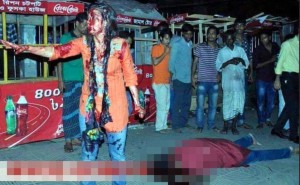
Dr Avijit Roy and Rafida Ahmed Bonya in the aftermath of the attack. (Source: Twitter via Daily Mail)
In 1952, East Pakistan (now Bangladesh) and West Pakistan (now just Pakistan) were jointly administered from Islamabad in West Pakistan, and the people of East Pakistan were protesting in an attempt to get their language, Bengali, officially recognized. On 19th February that year, several protesters were killed – martyrs to that cause. Twenty years later a book fair, celebrating books and writers in Bengali, was held on that day. The event has grown so much that it now runs for the entire month of February and has up to 400 publishing houses participating. (A publishing house must publish at least fifteen different books in Bengali to qualify for inclusion. )
This is the book fair Dr Avijit Roy was attending when he was murdered. His books on atheism, although popular in Bangladesh, are also extremely controversial in the far right of the Muslim community. He had several death threats over the years, and was warned not to return to the country of his birth from the USA, where he lived. His decision to do so was an expression of his strong support for the cause of the Bengali language, although he had undertaken to keep a low profile during his visit so as not to antagonize extremist elements.
Of course, merely existing with a different opinion is considered antagonistic by intellectual bullies, and they carried out their cowardly threat to kill him. Incapable of challenging alternative ideas in the intellectual arena, they resorted to murder in an attempt to silence dissent. However, just as killing those wanting to speak their native language in 1952 didn’t work, it won’t stop people thinking for themselves now.
A month since Roy’s death, I actually already had another story planned. I hoped the people of Bangladesh would have had time to think about what his death means for their society. I hoped it would lead them to further embrace the freedoms expressed in their constitution, and stand up to those attempting to take the country down the path of religious oppression. The sad death of Rahman means that unfortunately, the habit of the government of bowing to the demands of far right extremists hasn’t stopped – they clearly still feel emboldened enough to carry out such attacks. An article in the Eurasia Review on 21 March by Dr Rupak Bhattacharjee entitled ‘Rise of Religious Extremism and Atheism: Ominous Signs for Bangladesh’, blames Dr Roy for his own murder.
Throughout the article Dr Bhattacharjee acknowledges Roy’s right to freedom of thought and expression, but concludes by saying he should have shut up in the interests of a peaceful society! I wonder if he feels the same about those who protested for the right to have the language of Bengali officially recognized? Dr Bhattacharjee writes:
Dhaka’s intelligentsia is particularly concerned over the turn of events in which two extreme groups of young people are confronting each other: political Islamists opposing the present secular-democratic dispensation and the atheists who like to be called “progressives” but appear intolerant towards “anyone who believes in god”. This peculiar phenomenon has been developing in the country for two years or so.
…
Roy had created ‘Mukto-Mona’ (Free Mind) blog that published scores of articles focusing on scientific reasoning and political use of Islam. His harsh criticism of religious fanaticism infuriated the Islamic fundamentalists who want to transform Bangladesh into a theocratic state. Roy’s two latest books, “Obisshahser Darshon” (Philosophy of Disbelief) and “Bishwasher Virus”(The Virus of Faith) dealing with liberal thinking, skepticism and scientific reasoning made him an easy target of the ultra-right and reactionary forces although his narratives earned critical appreciation in some quarters.
Dr Bhattacharjee concluded his article with the words:
The young bloggers are also required to guard against recklessness and any radical interpretation of people’s faith in a traditional society like Bangladesh as that may only end up arousing raw emotion and disturbing social harmony.
The “young bloggers” are doing nothing wrong! Why should they shut up? They are not the ones calling for bloggers to be arrested for blasphemy and punished by death, or resorting to violence and committing brutal murders. Dr Bhattacharjee acknowledged earlier in his article that the Islamists have become emboldened because “… the polity … succumbed to state-sponsored Islamisation during the military rule”. The current government is attempting to restore secular provisions, and thus recognizes where the fault lies. It is not with those using words as their weapons, but those using machetes.
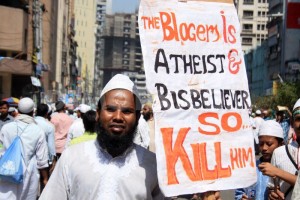
Protest march in Dhaka 8 April 2013 – member of Hefajate Islam calling for execution of atheist bloggers in custody, arrested for the non-crime of blasphemy. (Source: demotix.com)
Yesterday’s vigilante murder of Washiqur Rahman is the third murder of an atheist blogger and the fifth violent attack on atheists. In 2004 writer and Dhaka University professor Humayun Azad was attacked. There were two more attacks in 2013 – in January Asif Mohiuddin suffered a knife attack then in April, and while still recovering, he was arrested for blasphemy. At the same time the government announced seven other atheist bloggers were to be arrested according to Reporters Without Borders.
On 15 February 2013, architect and atheist blogger Ahmed Rajib Haider was found outside his home in a pool of blood. He could not be recognized following the attack. According to bdnews24.com:
Rajib was hacked in the head, jaw and shoulder before his throat was slit, said Pallabi Police Station’s Sub-Inspector Kamal Hossain.
Police found two blood-stained machetes apparently left behind by the killers just a few feet away from Rajib’s body.
Protesters believe Rajib became the target of fundamentalists for his interpretations of Islam from the standpoint of a self-proclaimed atheist.
His blogging attracted threats to his life. One such post is still there in ‘Sonar Bangla’, a blog known to have been operated by pro-Jamaat-e-Islami activists.
Protesters are convinced that the Jamaat and its student front Islami Chhatra Shibir assassinated Rajib.
Bangladesh is a new country with a secular constitution and much potential. Islamist extremists have been trying to make it a theocracy since its inception, and appear to be prepared to do anything to achieve their goal. They are damaging their country both internally and externally. Because of these latest murders, tourists will be reluctant to visit, losing Bangladesh much-needed income. Prime Minister Sheikh Hasina’s return to power in 2014 was extremely controversial, with most major opposition parties boycotting the election. It is time she proved she is worthy of the office.

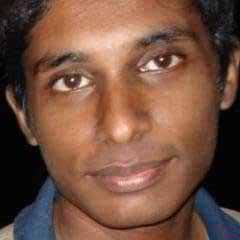
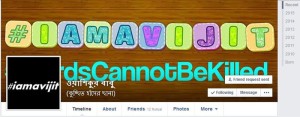
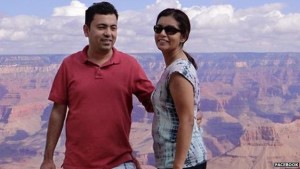

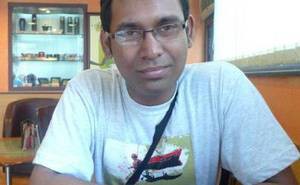
What’s the Aslanian explanation for this atrocity? The faithful regard their faith-based thinking as a virtue, but censorship and murder is so often the endpoint of intellectual weakness. These brave bloggers should inspire more of us to hammer faith at every possible opportunity, lest their deaths be in vain.
Perhaps Reza Aslan could explain for us how religion had nothing to do with any of these barbaric murders. At the moment I am not feeling very charitable towards believers of Islam right now.
Dr Bhattacharjee’s comparison of the extremists who butcher in the name of Islam, and those who support them, with atheist bloggers who write books and comments on the internet is charmingly ludicrous. His point of view, not uncommon, is a significant part of the problem. It is delusional to suppose that peace can be had in a place like
Bangladesh if only care is taken to not offend the religious crazies.
This is terribly sad news. It is hard to see how Bangladesh or many other Muslim countries in that part of the world will ever amount to anything worthwhile until they reject the religion and demand a safe and free society to live in. Progress never seems to include religion.
Thanks for covering this.
Religious belief/faith, any religious leaning a person holds is a death knell to any rationality that person ever had. To believe in sky-faeries, to believe they exist, to believe they teach wisdom to guide your life, is to be insane.
Thank you for covering this story. This should be on mainstream media everywhere.
> What’s the Aslanian explanation for this atrocity?
Maybe it was all that western colonialism which led to this…
Good day very nice web site!! Man .. Excellent .. Wonderful ..
I will bookmark your web site and take the feeds additionally?
I am glad to find numerous helpful information here in the publish,
we want develop more techniques on this regard,
thank you for sharing. . . . . .
The radical Islamist may hack the source of words to death but words and ideology can not be killed. His work is immortal for which he would always be adored and remembered.